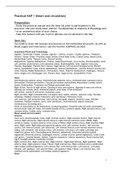Practical HAP 1 (heart and circulation)
Preparation:
- Study the practical manual and the item list prior to participation in the
practical. Use your study book, Martini: Fundamentals of Anatomy & Physiology and
/ or an anatomical atlas of your choice.
- Take this manual with you in print (phones are not allowed in the lab)
Item list:
You need to know the location and function of the mentioned structures. As well as
blood supply and innervation. Use the itemlist (CANVAS) sections
Anatomical Planes and Terminology:
Sagittal, Transversal, Frontal, Coronal, Superior / Inferior, Cranial / Caudal, Anterior / Posterior,
Ventral / Dorsal, Distal / Proximal, Body Cavities, Dorsal Body Cavity, Cranial Cavity, Spinal Cavity,
Ventral Body Cavity, Thoracic Cavity, Pleural Cavities.
Mediastinum: Superior Mediastinum, Thymus, Large Blood Vessels, Arcus Aortae, Brachiocephalic trunk,
Left common carotid artery, Left subclavian artery, Brachiocephalic veins, Superior vena cava,
Trachea, Esophagus, Thoracic Duct, Nerves, Vagal nerves, Left recurrent laryngeal nerve, Phrenic
nerves, Sympathetic trunk, Inferior Mediastinum, Anterior Mediastinum , Internal thoracic arteries and
veins, Thymus, Middle Mediastinum , Pericardium, Heart, Posterior Mediastinum, Esophagus, Thoracic
Aorta, Azygos vein, Hemiazygos vein, Thoracic Duct, Vagal nerves, Sympathethic Trunk.
Heart
Interventricular anterior sulcus, Interventricular posterior sulcus, Atrioventricular (coronary) sulcus,
Pericardium, Parietal pericardium, Visceral pericardium (epicardium), Myocardium (cardiac muscle
tissue), Endocardium, Transverse and Oblique pericardial sinus,
Right atrium, Auricle of right atrium, Opening of vena cava superior, Opening of vena cava inferior,
Opening van coronary sinus, Interatrial septum, Oval fossa, Crista terminalis,
Left atrium, Auricle of left atrium, Pulmonary veins,
Right ventricle, Right atrioventricular (tricuspid) valve, septal, anterior, posterior cusps, Chordae
tendineae, Papillary muslces, Pulmonary valve (semilunar), Pulmonary trunk,
Left ventricle, Left atrioventricular valve (mitral, bicuspid), anterior, posterior cusps, Chordae
tendineae, Papillary muslces, Aortic valve (semilunar), Interventricular septum (muscular,
membranous), Ascending aorta ,
Points of auscultation of the heartvalves, Conducting system, Sinoatrial node (SA node, pacemaker),
Atrioventrular node (AV node), AV bundle (bundle of His), Coronary vessels, Right coronary artery, Left
coronary artery, Cardiac veins, Coronary sinus,
Blood vessels and circulation
Arteries
Aortic arch, Brachiocephalic trunk, Right common carotid , Right external carotid , Right internal
carotid, Right subclavian, Right internal thoracic (right internal mammary artery (RIMA), Right
vertebral, basilar, Cerebral arterial circle (circle of Willis), Right axillary artery, Right brachial, Right
ulnar, Right radial, Right deep and superficial palmar arch, Left common carotid , Left external
carotid, Left internal carotid, Left subclavian, Left internal thoracic (Left internal mammary artery
(LIMA), Left vertebral, Left axillary artery, Left brachial, Left ulnar, Left radial, Left deep and
superficial palmar arch, Descending aorta (thoracic, abdominal), Intercostal arteries (paired
segmental), Bronchial arteries, Esophageal arteries, Lumbar arteries (paired segmental), Celiac trunk,
Left gastric, Common hepatic, Splenic, Superior mesenteric, Inferior mesenteric, Renal arteries (left,
right), Gonadal arteries ( testicular/ovarian)
Right common iliac, Right external iliac, Right femoral , Right deep femoral, Right popliteal , Right
anterior tibial, Right posterior tibial, Fibular, Right internal iliac, Right umbilical artery (obliterated:
right medial umbilical ligament), Left common iliac, Left external iliac, Left femoral , Left deep
femoral, Left popliteal , Left anterior tibial, Left posterior tibial, Fibular, Left internal iliac, Left
umbilical artery (obliterated: Left medial umbilical ligament)
Veins
1
,Superior vena cava, Brachiocephalic vein (right/left), Right/Left jugular vein (internal, external), Dural
synusses, Sagittal superior sinus, Sagittal inferior sinus, Straight sinus, Transverse sinus, Sigmoid sinus,
Cavernous sinus, Left/Right subclavian vein, Internal thoracic vein, Axillary, Cephalic , Brachial, Basilic,
Median cubital, Radial, Ulnar, Palmar venous arches, Intercostal veins , Azygos vein, Hemiazygos vein,
Inferior vena cava, Hepatic veins, Renal veins (left/right), Gonadal veins (testicular/ovarian,
left/right), Lumbar veins.
Right/Left common iliac , Internal iliac, External iliac, Femoral, deep femoral, popliteal, etc., Great
saphenous, Small saphenous, Portal vein , Superior mesenteric vein, Inferior mesenteric vein, Splenic
vein, Umbilical vein (obliterated: Round ligament of the liver (lig teres hepatis), prenatal and postnatal
circulation,
2
, 1. Heart
Assignment
Study the specimen or model and your book/slides. First, study the external heart and its
relationship to the other structures in the mediastinum:
− apex − coronary sulcus
− right and left atrium − pulmonary trunk
− auricles − ascending aorta
− right and left ventricle − coronary arteries
− interventricular sulcus (anterior − coronary sinus
and posterior)
Questions
1. From which embryonic structure do the right and left auricles develop? And
from which structures does the rest of the right and left atrium develop?
The primitive ventricle forms the left ventricle. The primitive atrium becomes the
anterior portions of both the right and left atria, and the two auricles. The sinus
venosus develops into the posterior portion of the right atrium, the SA node, and
the coronary sinus.
In the fetal heart, the left and right atria communicate via the foramen ovale in the
interatrial septum. Both atria develop from a single primitive atrium. The only
remnant of this in the left atrium is the atrial appendage. The smooth-walled
main cavity of the left atrium develops from the pulmonary veins.
Left = proximal lung veins.
2. What is the clinical relevance of these auricles? What is the effect of the shape
of the auricles on their function?
Collecting blood, a reservoir for extra blood.
Muscular (shape), so: turbulence in the blood flow, blood clots can form.
Assignment
Look at the specimen or model and your book/slides. Study the structures of the internal
heart as far as visible (use an anatomical atlas):
− Right atrium − Left ventricle
o Interatrial septum o Papillary muscles
o Oval Fossa o chordae tendineae
o Tricuspid valve (right o Interventricular septum
atrioventricular valve) − Membranous part
o Pectinate muscles − Muscular part
− Right ventricle Aortic valve (semilunar)
o
o Papillary muscles − Conducting system
o chordae tendineae o Sinoatrial node (SA node,
o Pulmonary valve
pacemaker)
(semilunar)
− Left atrium
3




